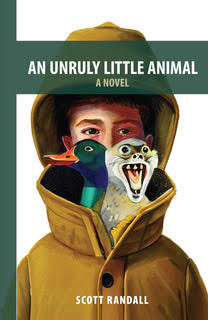Fifth grader Darby Tamm is worried. About his Career Fair Pair Presentation on Veterinary Dentistry (National Occupation Code 3114) with Jennie Phelps-Christianson, the semi-mysterious death of his fifth-grade teacher, his mother’s temporary teaching contract, his father’s Career Parent Presentation, the affair between his substitute teacher and Jennie’s mother Vice Principal Phelps-Christianson, his parents’ temporary trial separation, threats of violence from his former friends, and potentially being exposed for stealing from his father’s collection of vintage porn magazines.
An Unruly Little Animal DC Books
Scott Randall
$21.95
paper
280pp
9781927599600
In his debut novel, Scott Randall highlights the absurdities of the human condition, big and small, through a day in Darby’s life, interspersed with digressional chapters that play on the main narrative and Darby’s anxieties.
In many ways, An Unruly Little Animal is a book about boundaries, between childhood and adulthood; life and death; the ordinary and extraordinary; the appropriate and inappropriate; the sacred and profane; humans and animals. For a kid, these boundaries are clear. But Darby is in fifth grade now, and is starting to see the grey zones.
Through the motif of animals, Randall dismantles any sense of hierarchy between humans and animals to emphasize the absurdity of modern life. Darby frequently understands himself and the people around him in relation to animals, most notably through imagined scenarios where animals caused the car accident that killed his teacher. An absent mallard duck father becomes suicidal and deliberately flies into the car windshield. Mother and son mice and capybaras end up in or in front of the teacher’s car and also cause the deadly accident. The scenarios are dark, childish, and probably something to bring up in family counselling.
With the P.O.V. of a pre-teen, Randall has chosen an ideal framework to explore absurdism. Throughout the novel, Darby sees through many of the systems, rules, and performances that make up society and adulthood. One of the most uncomfortable ways this happens is when Darby is cognizant of how and why he is being parented or when he psychoanalyzes the people around him. Darby’s perceptiveness is a reminder that children notice more than adults think they do, for better and for worse.
There’s a satisfying musicality to Randall’s sentences. The formality and repetition of his language creates a slow-burn humour that ultimately leads to many satisfying full-circle moments. Similarly, much of the humour is derived from specificity. It’s not just a presentation, it’s the Career Fair Pair Presentation, and it’s not just a veterinarian, it’s Veterinary Dentistry (National Occupation Code 3114). Randall’s commitment to these bits is remarkable. Every once in a while the rhythm is interrupted by a word that seems out of place in an eleven-year-old’s consciousness (cuckold, pedagogy, logos, pathos, ethos), which keeps readers on their toes and provides some of the novel’s best laughs.
Much of the absurdity comes from the reverence afforded to certain topics. This is perhaps most evident, and hilarious, in a chapter that describes the vintage pornography Darby steals from his father. Randall makes full, diverse, and consistent use of humour – both subtle and overt, dark, witty, satirical, cringe, observational, and surreal – while maintaining respect and sensitivity for the topics and characters he handles.
While the children, namely Darby and Jennie, are precocious, they’re never the butt of a joke. Randall treats every character with empathy, as does his protagonist. Randall balances the “trivial” worries of an eleven-year-old boy with complex dilemmas: how do you talk about death, how do you protect someone’s feelings? Darby has fantasies of heroism, while at the same time worrying about fitting in and what’s right and wrong. Darby is thus in many ways an “old soul” who retains the charms and flaws of a child.
The novel’s ending is simple but satisfying. There are no great profound conclusions or answers, because that’s not what life is. Randall reminds us that sometimes all we can do is breathe, and try to do better next time.mRb






0 Comments